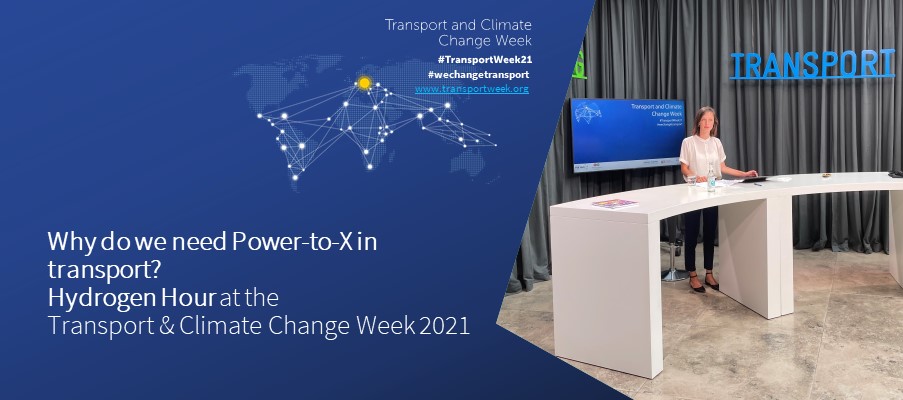Why do we need Power-to-X in transport? Jekaterina Boening, Heino von Meyer and Gonzalo Muñoz discussed the role of Power-to-X fuels for defossilising transport on 22nd June 2021 at the Transport and Climate Change Week. Charlotte Hussy, Advisor at the International Power-to-X Hub Berlin moderated the session. This article presents a summary of the inspiring talks of the three speakers and the following Q&A.
Gonzalo Muñoz, UN High Level Climate Champion of the COP25, spoke from his perspective as both a Chilean decision maker and a professional with strong expertise in climate action.
Muñoz emphasised that a climate neutral and resilient world must be achieved by 2050 – the current race is towards net zero emissions. Ramping up renewable energy capacities is imperative in reaching this goal. But electrifying the grid and decarbonising the energy sector is not enough. For hard-to-abate sectors, such as aviation and maritime transport, as well as the chemical, steel and cement industries, a different solution is needed: Power-to-X and green hydrogen. These technologies are critical for reaching net zero.
High efficiency losses in the production of Power-to-X products such as methanol and ammonia mean it should not be seen as a solution across all transport sectors. However, for intercontinental aviation, long-haul shipping, and heavy-duty trucking that cannot directly electrify – Power-to-X is the way forward.
For countries such as Chile, green hydrogen and Power-to-X not only present an opportunity to decarbonise the economy, but also to become relevant players worldwide through exporting the produced fuels and chemicals.
Ambition is building towards hydrogen and Power-to-X: Muñoz expects the beginning of an exponential growth of demand and supply of hydrogen and Power-to-X and currently multiple initiatives are being created. One of them is Green Hydrogen Catapult. Seven leading companies are installing 25 GW green hydrogen electrolysers by 2026 to drive down the costs for green hydrogen to below two dollars per kilogram.
Heino von Meyer, Global Relations and Networking at the International Power-to-X Hub Berlin, starts his talk about “How Power-to-X works” with a quote by a famous author:
“Yes, my friends, I believe that water will one day be used as fuel.”
Jules Verne, 1874
Jules Verne was once called the father of science fiction, but now his vision has become reality. Power-to-X produces sustainable, fossil-free fuels and feedstocks out of water, wind, sun and air. Synthetic E-kerosene has the same properties as its fossil counterpart, but a carbon footprint next to zero.
But more than just technology is needed: social and societal issues must be considered, and financial incentives to boost investment on the supply side as well as financial incentives targeted towards the customer and consumer must be provided. Both rely on the clarity and predictability of regulatory frameworks.
Sustainability dimensions and internationally agreed certification schemes are central elements of such frameworks. Their design and implementation, monitoring and enforcement still present big challenges. The International Power-to-X Hub Berlin is part of the global effort to overcome these and introduce new regulatory frameworks.
Jekaterina Boening, Senior Policy Advisor at Transport and Environment emphasises the need to get it right from the start: As with each step of the Power-to-X production process we are losing energy (two to 14 times more than with direct electrification), sustainability criteria are crucial:
- Additional renewable energy: With a share of more than 90% renewable energy, Power-to-X products have a lower carbon footprint than their fossil counterparts. As no country currently employs a consistent share of 100 % renewable energy, the RE plants for Power-to-X production should be new and not connected to the grid.
- Sourcing CO2 can either be done from biomass or industrial point sources or via direct air capture. Because the availability of industrial point sources will decrease as more and more coal power plants shut down as well as potential point sources from the steel and cement industries emit less CO2, direct air capture is the sustainable pathway for sourcing CO2.
These sustainability requirements and energy losses are the reason why Power-to-X is not to be seen as an option for all transport sectors, but for those that cannot otherwise electrify, such as aviation and shipping. Ammonia in particular presents a good option for shipping, as no CO2 is needed and the synthesis processes are comparably efficient.
After the speaker’s presentations, Jekaterina Boening and Heino von Meyer answered questions from the audience.
Q&A: Is there enough water for Power-to-X?
Water can be a critical resource in the PtX value chain. In regions with water stress desalination of sea water could provide a solution, if it is also run with renewable energy. Furthermore, it could provide co-benefits for both for local communities or farming.
Q&A: Is the production of synthetic E-kerosene economically viable in comparison to fossil kerosene?
The price of synthetic kerosene is going to drop significantly. The current estimation is 2 to 3 € per litre in 2030. Premiums can support this as well.
Massive cost degressions are hoped for and similar decreases have taken place before- for instance in the photovoltaic sector. Electrolysers offer huge potentials for serial production.
Q&A: How can Power-to-X benefit producing countries?
The debate needs to shift from a Northern perspective of import to how Power-to-X can help sustainably develop the producing countries. In line with this, industries and sectors within the country must be identified, in which Power-to-X products can be directly used.
Also in Europe, the potentials for Power-to-X need to be leveraged as well, for example in the South of Spain and on the coasts of Ireland and the UK.
The Hydrogen Hour was jointly organised by the International Power-to-X Hub Berlin, Women in Green Hydrogen and the Deutsche Gesellschaft für Internationale Zusammenarbeit (GIZ) GmbH.
The Transport & Climate Change Week is organised by the Deutsche Gesellschaft für Internationale Zusammenarbeit (GIZ) GmbH on behalf of the Federal Ministry for the Environment, Nature Conservation and Nuclear Safety (BMU) financed by the International Climate Initiative (IKI).
